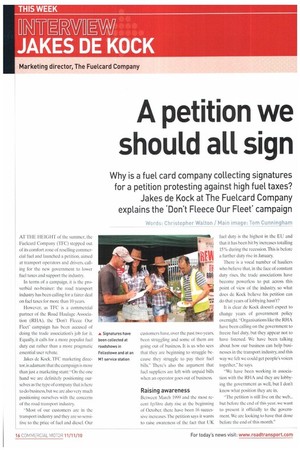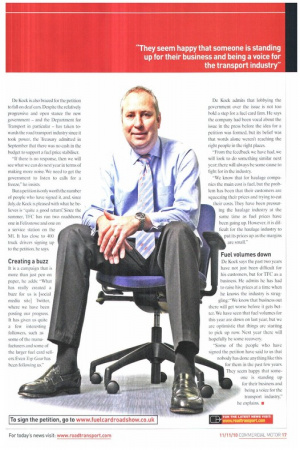A petition we should all sign
Page 16

Page 17

If you've noticed an error in this article please click here to report it so we can fix it.
Why is a fuel. card company collecting signatures for a petition protesting against high fuel taxes? Jakes de Kock at The Fuelcard Company explains the 'Don't Fleece Our Fleet campaign
Words: Christopher Walton / Main image: Tom Cunningham AT THE HEIGHT of the summer, the Fuelcard Company (TFC) stepped out of its comfort zone of reselling commercial fuel and launched a petition, aimed at transport operators and drivers, calling for the new government to lower fuel taxes and support the industry.
In terms of a campaign. it is the proverbial no-brainer: the road transport industry has been calling for a fairer deal on fuel taxes for more than 10 years.
However, as TFC is a commercial partner of the Road Haulage Association (RHA), the 'Don't Fleece Our Fleet' campaign has been accused of doing the trade association's job for it. Equally, it calls for a more populist fuel duty cut rather than a more pragmatic essential user rebate.
lakes de Kock, TFC marketing director, is adamant that the campaign is more than just a marketing stunt: On the one hand we are definitely positioning ourselves as the type of company that is here to do business, but we are also very much positioning ourselves with the concerns of the road transport industry.
Most of our customers are in the transport industry and they are so sensitive to the price of fuel and diesel. Our customers have, over the past two years, been struggling and some of them are going out of business. It is us who sees that they are beginning to struggle because they struggle to pay their fuel bills." There's also the argument that fuel suppliers are left with unpaid bills when an operator goes out of business.
Raising awareness Between March 1999 and the most recent 1p/litre duty rise at the beginning of October, there have been 16 successive increases The petition says it wants to raise awareness of the fact that UK fuel duty is the highest in the EU and that it has been hit by increases totalling 15% during the recession. This is before a further duty rise in January.
There is a vocal number of hauliers who believe that, in the face of constant duty rises, the trade associations have become powerless to put across this point of view of the industry, so what does de Kock believe his petition can do that years of lobbying hasn't?
It is clear de Kock doesn't expect to change years of government policy overnight. -Organisations like the RHA have been calling on the government to freeze fuel duty, but they appear not to have listened. We have been talking about how our business can help businesses in the transport industry, and this way we felt we could get people's voices together," he says.
"We have been working in association with the RHA and they are lobbying the government as well, but I don't know what position they are in.
-The petition is still live on the web.., but before the end of this year, we want to present it officially to the government. We are looking to have that done before the end of this month."
De Kock is also braced for the petition to fall on deaf ears. Despite the relatively progressive and open stance the new government — and the Department for Transpoit in particular — has taken towards the road transport industry since it took power, the "treasury admitted in September that there was no cash in the budget to support a fuel price stabiliser.
"If there is no response, then we will see what we can do next year in terms of making more noise. We need to get the government to listen to calls for a freeze," he insists.
But a petition is only worth the number of people who have signed it, and, since July, de Kock is pleased with what he believes is "quite a good return'.' Since the summer, TFC has run two roadshows, one in Felixstowe and one on a service station on the MI. It has close to 400 truck drivers signing up to the petition. he says.
Creating a buzz It is a campaign that is more than just pen on paper, he adds: "What has really created a buzz for us is [social media site] Twitter, where we have been posting our progress. It has given us quite a few interesting followers, such as some of the manufacturers and some of the larger fuel card sellers. Even Top Gear has been following us."
De Kock admits that lobbying the government over the issue is not too bold a step for a fuel card firm. He says the company had been vocal about the issue in the press before the idea for a petition was formed, but its belief was that words alone weren't reaching the right people in the right places.
"From the feedback we have had, we will look to do something similar next year there will always be some cause to fight for in the industry.
"We know that for haulage companies the main cost is fuel, but the problem has been that their customers are squeezing their prices and trying to cut their costs. They have been pressuring the haulage industry at the same time as fuel prices have been going up. However, it is difficult for the haulage industry to put its prices up as the margins are small."
Fuel volumes down
De Kock says the past two years have not just been difficult for his customers, but for TFC as a business. He admits he has had to raise his prices at a time when he knows the industry is strug
gling:"We know that business out there will get worse before it gets better. We have seen that fuel volumes for this year are down on last year, but we are optimistic that things are starting to pick up now. Next year there will hopefully be some recovery "Some of the people who have signed the petition have said to us that nobody has done anything like this for them in the past few years. They seem happy that someone is standing up for their business and being a voice for the transport industry," he explains. •




























































































































